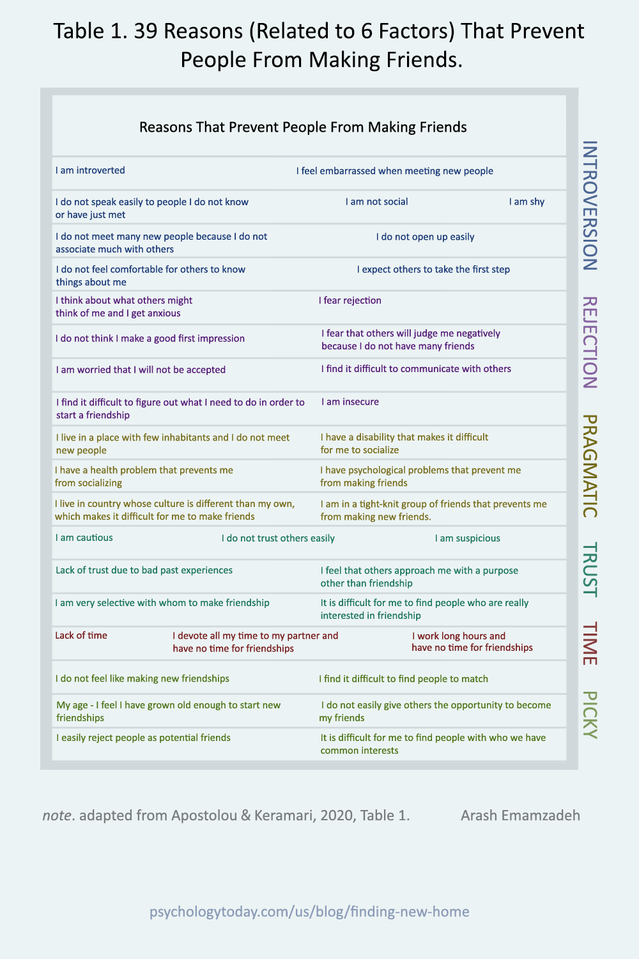Friends
39 Reasons We Fail to Make Friends
A new study examines potential obstacles to friendship.
Posted September 3, 2020 Reviewed by Matt Huston

How many friends do you have? Do you find it easy to make friends? Perhaps, at times, you have wondered why some people have many friends, while others are solitary. Is it shyness? Lack of time? Fear of rejection?
New work by researchers in Cyprus, Apostolou and Keramari, published in the September 2020 issue of Personality and Individual Differences, identifies 39 reasons that prevent people from making friends.
Investigation of obstacles to making friends
In Study 1, 10 male and 10 female (average age 34 years) Greek-speaking participants took part in in-depth interviews, discussing potential reasons they had trouble making friends. For the next phase of the investigation, 52 men and 56 women (average age of 25 years) participated in an open-ended survey. Participants were asked to name reasons that prevented them from making friends. Then, two graduate students coded and categorized these responses.
At the end of the analysis, the barriers to friendship were categorized as 39 different reasons.
In Study 2, the reasons from the first investigation were analyzed to determine broader categories. The sample for this investigation consisted of 622 participants (295 men; average age of 34 years) from Cyprus and Greece.
The participants rated each of the 39 reasons in terms of the importance of these concerns in preventing them from making friends. Six factors emerged from the analysis of these results: Introversion, pickiness (e.g., easily rejecting others), difficulty trusting strangers, time constraints, insecurity and fears of rejection, and a few other reasons that the authors labeled “pragmatic reasons” (e.g., having a disability or health condition, not having regular opportunities to meet new people, being an immigrant).
Results: The percentages of participants who considered one of the six factors above important in preventing them from making friends are as follows:
- Low trust (37%)
- Lack of time (29%)
- Introversion (23%)
- Pickiness (16%)
- Rejection fears (10%)
- Pragmatic reasons (2%)
Pragmatic reasons (particularly health conditions) were the least commonly reported obstacle to friendship, perhaps because the sample was relatively young—and disabling health conditions are more common in older individuals. Indeed, aging effects were observed: Older participants were more prone to endorse lack of time, pickiness, and pragmatic reasons, and less likely to endorse introversion and fear of rejection.
Why did older people consider time constraints an obstacle to making friends? Likely because compared to younger individuals, older folks are more likely to have obligations (e.g., children, longer working hours). As for why shyness and fear of rejection were of less concern to them, we can speculate that older members of the sample were either more reluctant to admit to such concerns or they have learned to manage their shyness and rejection fears better as they have gotten older.
Sex differences were also observed, particularly for three factors: Low trust, lack of time, and rejection fears. Specifically, women were more likely than men to consider low trust and fear of rejection important, while men viewed time constraints as more consequential.
The six factors and 39 obstacles to friendship, as reported by the authors, are listed in the table below.

In applying the findings of this study to our lives, it is important to remember that this research was conducted in Greece and Cyprus, not in the U.S. For instance, as the researchers suggest, a lack of trust might be an even bigger obstacle to friendship in the life of Americans, who are more individualistic than Greeks, on average, and more likely to leave old friends and family behind while in search of work or romantic opportunities. Such a way of life would require having to rebuild one’s friendship network from scratch and trusting strangers.
The same can be said of those who have had to leave their hometown and native country, whether for social, economic, political, or environmental reasons.
Difficulty in making friends is a serious concern because it could be costly to our physical and mental health. As researchers John and Stephanie Cacioppo noted, in a letter in The Lancet, loneliness is associated with depression and a “26% increase in the risk of premature mortality.” In industrialized countries, they added, “around a third of people are affected by this condition, with one person in 12 affected severely, and... these proportions are increasing.”
Of course, it is true the psychological experience of loneliness is not always due to difficulties in making friends, and yes, factors other than loneliness, including relationships with abusive “friends,” could also affect our mental health negatively.
Nevertheless, to the extent that our loneliness is due to problems with making friends, relevant interventions and programs may be immensely useful. Time management classes, programs that encourage participation in social events, and even personal psychotherapy for managing mental health issues that hinder making friends and maintaining friendship can be helpful. With the right support and guidance, we can overcome many barriers to making friends.
To find a therapist near you, visit Psychology Today's therapy directory.
Facebook image: Marjan Apostolovic/Shutterstock




